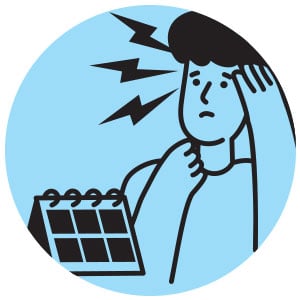Alexis was sitting in chemistry class, quietly freaking out. She had a math test coming up, and she was worried she was going to get a bad grade. In her mind, a bad grade on the test could affect her grade for the semester, which in turn might affect her ability to get into a good college. If she didn’t go to a good college, she might not be able to get a job. She became convinced her entire future depended on a single test. “I felt like I had swallowed a jar of butterflies,” she says. “My stomach hurt so bad. I couldn’t sit still, and I felt like I was going to throw up.”
At that moment, Alexis was experiencing anxiety. Simply put, anxiety is a feeling of fear, dread, or uneasiness about the future. If you’re feeling anxious, you might have sweaty palms, a dry mouth, and a racing pulse. Or, like Alexis, you might feel sick to your stomach.
It’s normal to be nervous before a big event like a test or a school play. In these situations, a little bit of anxiety can even be helpful by motivating you to study or practice your lines. But sometimes your worries can negatively affect your ability to live your life.
If your concerns about the future are more harmful than helpful, you may have what’s known as an anxiety disorder. But excess anxiety doesn’t have to rule your life. There are many ways people manage anxious thoughts and feelings. Their techniques may also work for you.
Read on to learn about how two teens experience anxiety and their tips for keeping it under control.




